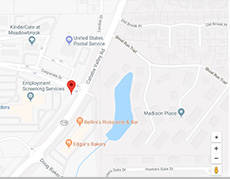
After this, I saw the chain fall off, and I opened the vault door. Inside were four scrolls. But then something happened. The chain became like a snake, and after opening the vault, it tried to reconnect and climb back up the vault. It tried to bring fear back to the mind. The Lord said, "My mercies are new every morning, and great is My faithfulness. I want you to cut off the chains of fear from your vault daily. Then you will be able to get fresh downloads from Me every day, which I keep for you in your 4D vault."
Moses is preparing God's people to enter into the inheritance God had repeatedly promised. The land of promise lay before them. Full of blessings and opportunities. God had already given it, but they must possess it by faith. So, Moses provided them a template. The Lord your God will cross over before you. He will destroy these nations from before you and you will possess them.
Recently, I had the privilege of ministering at an outpouring of the Holy Spirit service. It was amazing to see the power of the Holy Spirit at work in the lives of those present. There was a palpable sense of God's presence among those present. As we pursue God with more fervor and consistency in the upcoming years, I am certain that we will see a greater outpouring of the Holy Spirit. Acts 2:17 says, "I will pour out my Spirit on all flesh." Your sons and daughters will prophesy, your young men will see visions, your old men will dream dreams. Even on my servants, both men and women, I will pour out my Spirit in those days, and they will prophesy."
I've heard it said that prayer is never a waste of time. However, I would dare to say that prayer can be ineffectual if: (1) you have no purpose because it is only a religious habit, or (2) you don't know the principles governing prayer. Some of the sermons I have heard on prayer would lead you to believe that all prayer is something you do to please God, or something you do for God. Jesus taught us that there are many kinds of prayer. Prayer or "talking with God" is for our benefit and for fellowship with our Creator.
As the natural world shifts from one season to another, we are reminded of the profound changes that also occur in the spiritual realm. Just as the earth moves through cycles of growth, harvest, and rest, so too does our spiritual journey. God uses the natural changes in seasons to mirror the shifts He desires to bring about in our hearts and lives. Now, more than ever, God is calling His people to seek His presence and be transformed by His glory.
The Hebrew new year 5785 begins at sundown, Oct. 2, and we enter the month of Tishri, which is the seventh month on the Hebrew religious calendar and the first month on the Hebrew civil calendar. This is why it is called "head of the year." Tishri is noted for three fall feasts. They are the Feast of Trumpets or Rosh Hashanah, which begins on the first of Tishri, or Oct. 2, at sundown; then Yom Kippur, or Day of Atonement, which begins at sundown Oct. 11 and runs through sundown Oct. 12; and then Feast of Sukkot or Tabernacles which begins at sundown Oct. 16 through Oct. 23.
Do you know you're stronger than you think? Do you know God has placed a holy determination inside you—an ability to handle things that come your way and never give up? We all have dreams, and we all experience times in life when we feel like throwing in the towel. Or we say a quick prayer and hope everything will just magically change. However, only wishing for things or situations in life to get better or to be different does not bring change or results.
As Timothy oversaw the church in Ephesus, Paul exhorted him to "fan into flame the gift of God" (2 Tim. 1:6b, NIV). Despite this, within a generation, the church in Ephesus faced a stern rebuke from Jesus for abandoning its first love, with the only remedy being a return to its initial deeds (Rev. 2:2-5). How did this once-thriving community lose its fervor? Perhaps it grew too comfortable, relying on its robust infrastructure, sound doctrine and well-organized systems.
A curious thing happened after Moses constructed the ancient tabernacle in the Sinai desert. First, Aaron made sacrifices for the sins of the people; then fire fell from heaven and consumed the offering. Then, Leviticus 9:24b (NASB 1995) says, "when all the people saw it, they shouted and fell on their faces." And God told Moses that the priests were to keep this supernatural fire burning perpetually. A similar thing happened when Solomon built a permanent temple in Jerusalem. After the construction was finished, Solomon prayed and dedicated the building to the Lord. Suddenly fire came from heaven and consumed the offerings.
You never forget the feeling of sorrow and loss that occurs when someone close to you dies. I loved my father dearly. When he passed away in 1991, it took me weeks to get beyond the initial impact of grief and mourning. Each day when I awoke, that sense of loss would hit me again as I thought, "My daddy is dead." He was a wonderful father and grandfather. I am thankful that we had the opportunity to make so many wonderful memories together. His life was indeed a celebration. Though I knew Dad was with the Lord, his absence from this life left a void that took awhile to get over.












